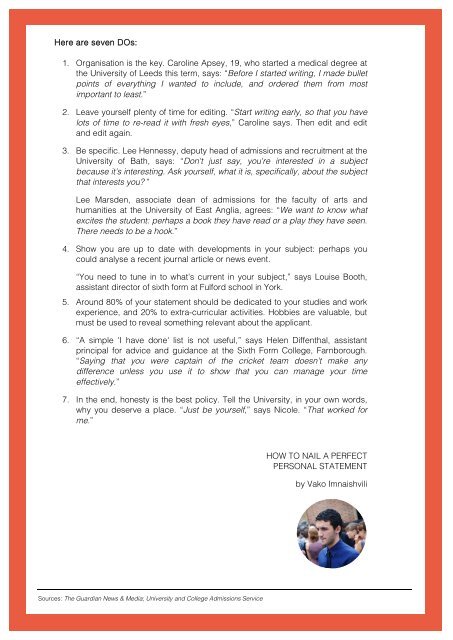Tips Personal_statement
You also want an ePaper? Increase the reach of your titles
YUMPU automatically turns print PDFs into web optimized ePapers that Google loves.
Here are seven DOs:<br />
1. Organisation is the key. Caroline Apsey, 19, who started a medical degree at<br />
the University of Leeds this term, says: “Before I started writing, I made bullet<br />
points of everything I wanted to include, and ordered them from most<br />
important to least.”<br />
2. Leave yourself plenty of time for editing. “Start writing early, so that you have<br />
lots of time to re-read it with fresh eyes,” Caroline says. Then edit and edit<br />
and edit again.<br />
3. Be specific. Lee Hennessy, deputy head of admissions and recruitment at the<br />
University of Bath, says: “Don't just say, you're interested in a subject<br />
because it's interesting. Ask yourself, what it is, specifically, about the subject<br />
that interests you? ”<br />
Lee Marsden, associate dean of admissions for the faculty of arts and<br />
humanities at the University of East Anglia, agrees: “We want to know what<br />
excites the student: perhaps a book they have read or a play they have seen.<br />
There needs to be a hook.”<br />
4. Show you are up to date with developments in your subject: perhaps you<br />
could analyse a recent journal article or news event.<br />
“You need to tune in to what's current in your subject,” says Louise Booth,<br />
assistant director of sixth form at Fulford school in York.<br />
5. Around 80% of your <strong>statement</strong> should be dedicated to your studies and work<br />
experience, and 20% to extra-curricular activities. Hobbies are valuable, but<br />
must be used to reveal something relevant about the applicant.<br />
6. “A simple 'I have done' list is not useful,” says Helen Diffenthal, assistant<br />
principal for advice and guidance at the Sixth Form College, Farnborough.<br />
“Saying that you were captain of the cricket team doesn't make any<br />
difference unless you use it to show that you can manage your time<br />
effectively.”<br />
7. In the end, honesty is the best policy. Tell the University, in your own words,<br />
why you deserve a place. “Just be yourself,” says Nicole. “That worked for<br />
me.”<br />
HOW TO NAIL A PERFECT<br />
PERSONAL STATEMENT<br />
by Vako Imnaishvili<br />
Sources: The Guardian News & Media; University and College Admissions Service


